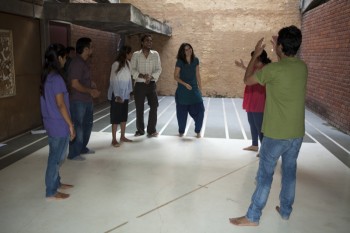You are here
Arts in India

Natasha Cohen-Carroll '13 (center) leading an improv workshop at Darpana
Details
On just the second day of her Center for Peace and Global Citizenship-funded internship at the Darpana Academy of Performing Arts, English and fine arts double major Natasha Cohen-Carroll ‘13 was whisked away to a remote village in Ahmedabad, India, to observe a dying art form called Bhavai, a form of folk theater.
Upon arrival, Cohen-Carroll met the last true Bhavai artist and was able to talk to him about his life and work.“It was very interesting for me to be part of such an experience since Darpana is trying to keep this art form alive,” she says.“Indeed, they use Bhavai techniques and format in many of their projects. Using Bhavai, the actors are often more able to connect with the communities they perform in, as they are often tribal areas where [the] tradition is still preserved.”
Founded over sixty years ago, the Darpana Academy of Performing Arts sees art not only as a tool to bring people together but as a tool for change as well. Originally, a small dance academy, Darpana has become a dynamic arts workshop that includes a conservatory and performance group. Each of Darpana's groups uses art to highlight contemporary social justice issues.
“I'm getting hands-on experience [in] the process of using art as an important medium for raising awareness about crucial issues,” said Cohen-Carroll.“The subjects dealt with are incredibly diverse, highlighting subjects such as women's empowerment, environmental degradation, corruption, HIV/AIDS and many others.”
During her internship, Cohen-Carroll was tasked with writing the report for the center's most recent project, which involves training local actors and performing plays about family planning. Additionally, she had the opportunity to be directly involved with the arts by teaching children's acting workshops.
“I was interested in pursuing this internship to see how tradition and innovation can be brought together to make a difference,” said Cohen-Caroll.“Art can be an incredibly effective form of challenging certain issues and asking difficult questions that otherwise might not have been asked or dealt with.”
--Stephen W. Handlon '13



